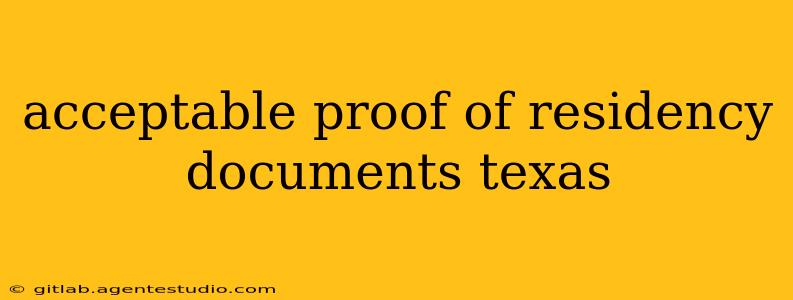Finding acceptable proof of residency documents in Texas can be confusing. This guide provides a comprehensive list of acceptable documents, categorized for clarity, to help you navigate the process smoothly. Whether you're registering to vote, obtaining a driver's license, or dealing with other official matters, understanding what constitutes valid proof is crucial. We'll also cover some common questions and considerations to ensure you're fully prepared.
Categories of Acceptable Proof of Residency Documents
Texas state agencies and organizations often have specific requirements for residency verification. While the exact documents accepted may vary slightly depending on the specific need, the following categories generally encompass most acceptable proof:
1. Government-Issued Documents:
These are generally the strongest forms of proof and often preferred.
- Texas Driver's License or Identification Card: A current Texas driver's license or state-issued identification card is the most common and readily accepted form of proof.
- U.S. Passport: A valid U.S. passport is strong evidence of residency, especially if it shows your Texas address.
- Military ID Card: Active duty military personnel can use their military ID card, along with supporting documentation showing their Texas address.
- Voter Registration Card: A Texas voter registration card confirms your residency at the address listed.
2. Mail Received at Your Texas Address:
These documents, while less definitive than government-issued IDs, can be acceptable when combined with other forms of proof. Ensure the mail is recent (within the last 60 days is generally preferred) and clearly displays your name and address.
- Bank Statements: Bank statements from a Texas bank clearly showing your name and address.
- Utility Bills: Utility bills (electricity, gas, water, or even internet service) displaying your name and current Texas address.
- Paystubs: Paystubs from a Texas employer showing your name and address.
- Government Checks or Benefit Statements: These include Social Security checks, Medicare statements, or other government benefit documents mailed to your Texas address.
3. Other Acceptable Documents:
In certain situations, these supporting documents may be considered alongside other evidence of residency.
- Lease or Rental Agreement: A signed lease or rental agreement, clearly showing your name and the Texas address.
- Homeowners Insurance Policy: Proof of homeowners insurance for a property located in Texas.
- Property Tax Statement: A current property tax statement for a Texas property.
Important Considerations:
- Document Validity: Ensure all documents are current and not expired.
- Name Consistency: All documents should consistently display your current name.
- Address Consistency: All provided documents should show the same Texas address.
- Multiple Documents: Providing multiple documents from different categories significantly strengthens your application. This helps mitigate any potential discrepancies and demonstrates a clear pattern of residency.
- Specific Agency Requirements: Always check with the specific agency or organization for their exact requirements, as they may have slightly different policies. Their website usually provides a detailed list of accepted documents.
Conclusion:
Gathering acceptable proof of residency in Texas requires careful attention to detail. By understanding the categories of acceptable documents and considering the key points mentioned above, you can significantly streamline the process. Remember to always verify the specific requirements with the relevant organization before submitting your documents. This will ensure a smooth and efficient experience.

